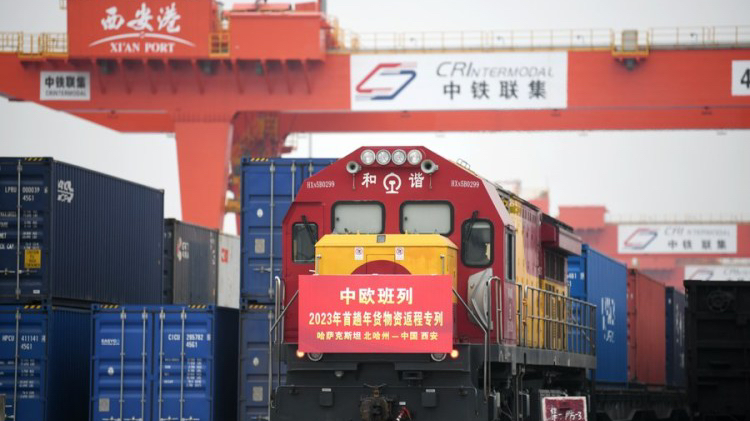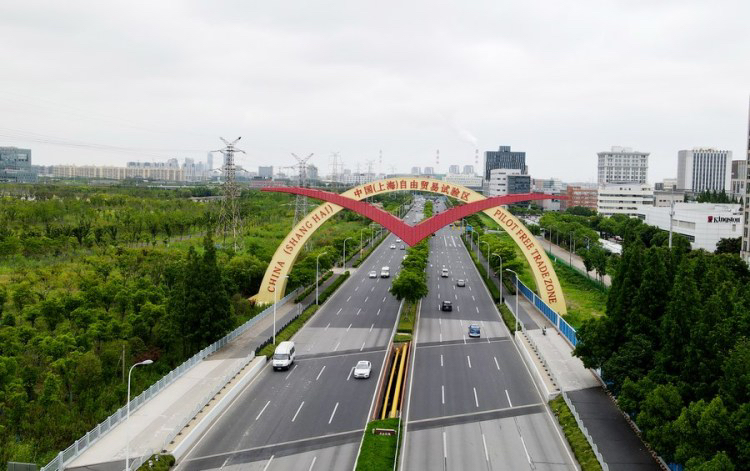
A China-Europe freight train loaded with 1,300 tonnes of flour from Kazakhstan arrives at Xi'an International Port in Xi'an, northwest China's Shaanxi Province, January 13, 2023. /Xinhua
A China-Europe freight train loaded with 1,300 tonnes of flour from Kazakhstan arrives at Xi'an International Port in Xi'an, northwest China's Shaanxi Province, January 13, 2023. /Xinhua
Editor's note: March 2023 marks the 10th anniversary when the concept of "community with a shared future for mankind" was first introduced by China. To commemorate this occasion, CGTN is working with the Institute for a Community with Shared Future from Communication University of China, to invite researchers specialized in the field from around the world to contribute their visions. Maria Francesca Staiano is the Director of the Latin American Research Academy on Community for Shared Future and Belt and Road Initiative, and the Director of the Center on China Studies of the International Relations Institute at the National University of La Plata in Argentina. The article reflects the author's views and not necessarily those of CGTN.
The idea of a "community with a shared future for mankind" was first proposed by Chinese President Xi Jinping when he spoke at the Moscow State Institute of International Relations in March 2013.
Two years before his speech, China's White Paper on Peaceful Development, published in September 2011, had implied this concept, stating that "China aligns its own interests with the common interests of the people of the world" as the country works to establish a "community of common interests" with other countries.
"The international community should reject the zero-sum game which was a product of the old international relations, the dangerous cold and hot war mentality, and all those beaten tracks which repeatedly led mankind to confrontation and war," the report added.
Later this concept was upheld in then-Premier Wen Jiabao's speech during the 14th Association of Southeast Asian Nations-China Summit, and taken up by then-President Hu Jintao in the opening speech of the 18th National Congress of the Communist Party of China (CPC) in 2012, and later the expression was perfected by President Xi Jinping in his speeches, respectively at the Moscow State Institute of International Relations in 2013 and on the occasion of the 70th anniversary of the establishment of the United Nations in 2015.
The concept includes five contents: political association, security, economic development, cultural exchanges and environment. This perspective was taken up in Xi's speech at the United Nations in Geneva in January 2017, and the idea of the essential need to "build a community with a shared future" was confirmed in October of the same year in his report to the 19th National Congress of the Communist Party of China.
The international importance of this concept to the future of humanity and the planet has been manifested in numerous summits and Chinese foreign policy documents.

Aerial photo shows the China (Shanghai) Pilot Free Trade Zone (FTZ) in east China's Shanghai, June 21, 2022. /Xinhua
Aerial photo shows the China (Shanghai) Pilot Free Trade Zone (FTZ) in east China's Shanghai, June 21, 2022. /Xinhua
However, one of the most recent and relevant occasions is the Resolution 43/21 of the UN Human Rights Council of June 22, 2020, called "Promoting mutually beneficial cooperation in the field of human rights," which attached great importance to international relations based on mutual respect, equity, justice and mutually beneficial cooperation.
The idea of creating a "community with a shared future for mankind" has common roots with similar concepts: the aspiration for a new humanism, in line with the construction of sustainable development with the support of the 2030 Agenda, has recently manifested at the global level as many intellectuals in recent years have published their articles and analyses, calling on the government to adopt a new model of scientific, technical, moral and rational development that focuses on the human being in their natural context.
Among these, one of the most incisive is undoubtedly French philosopher Edgar Morin, who was the first to deepen the notion of "community of planetary destiny" in 2001, theorized by Austrian political leader Otto Bauer with the term "Schicksalgemeinschaft" in German in 1907, and later illustrated by the Chinese government with the expression "community with a shared future for mankind."
The idea of creating a "community of a shared future for mankind," formulated by China and involving all aspects of international relations in a multidimensional and global way, answered to the need for a "new type" of international relations and a "democratization" of them, for a more just and equitable international order, including visions from a Global South.
(If you want to contribute and have specific expertise, please contact us at opinions@cgtn.com. Follow @thouse_opinions on Twitter to discover the latest commentaries in the CGTN Opinion Section.)